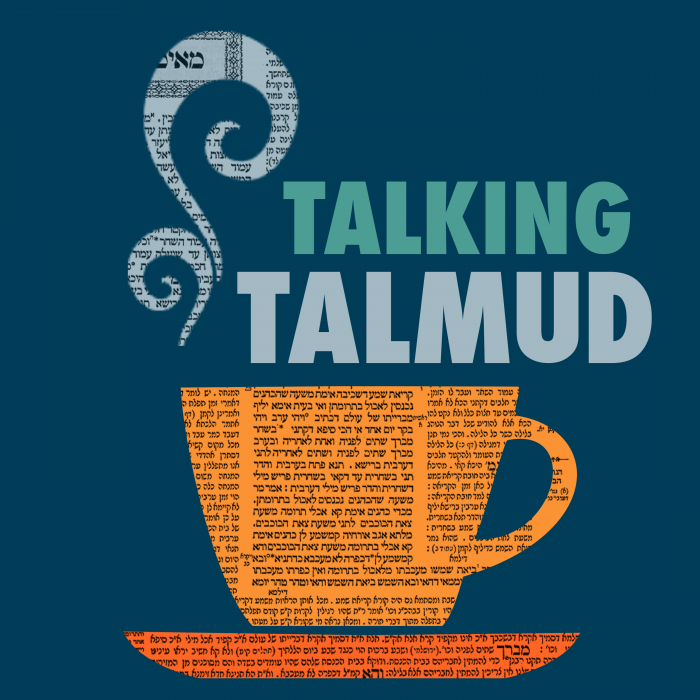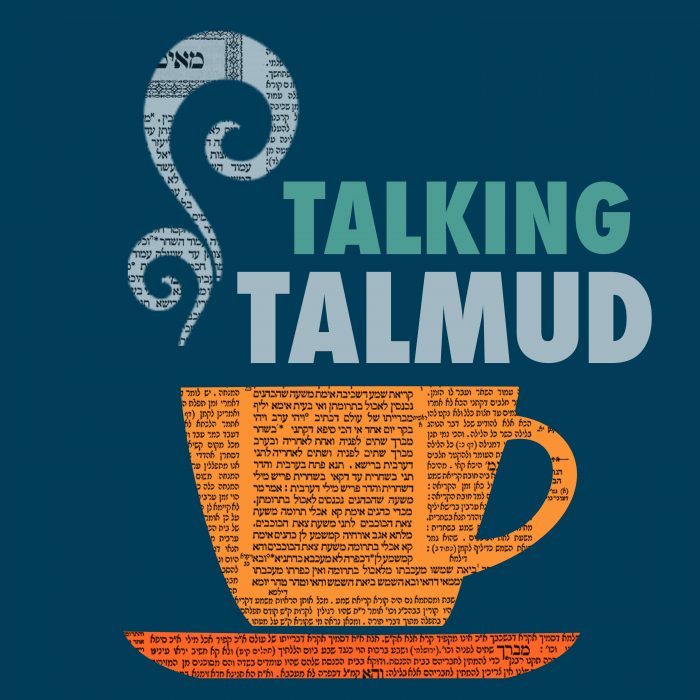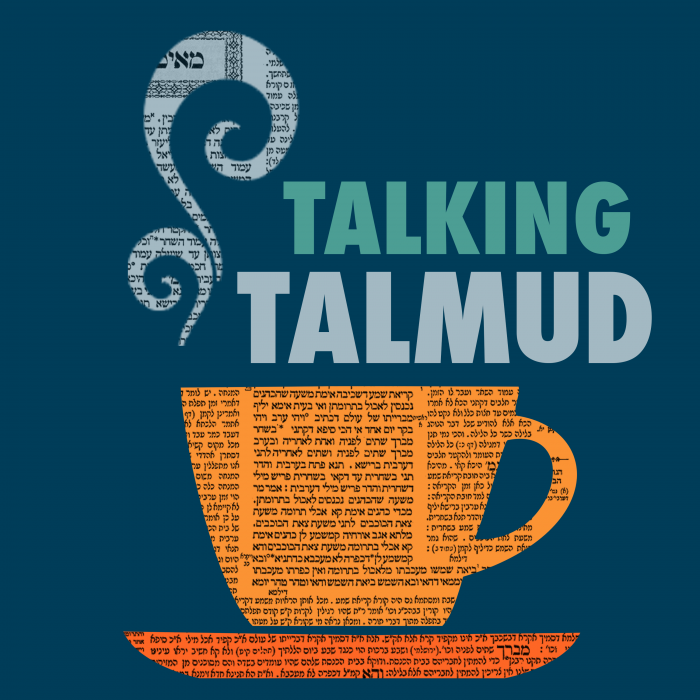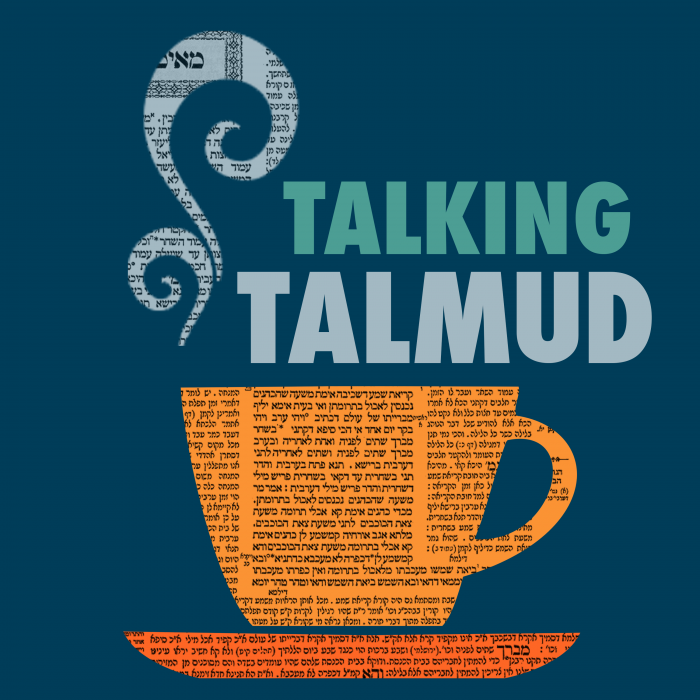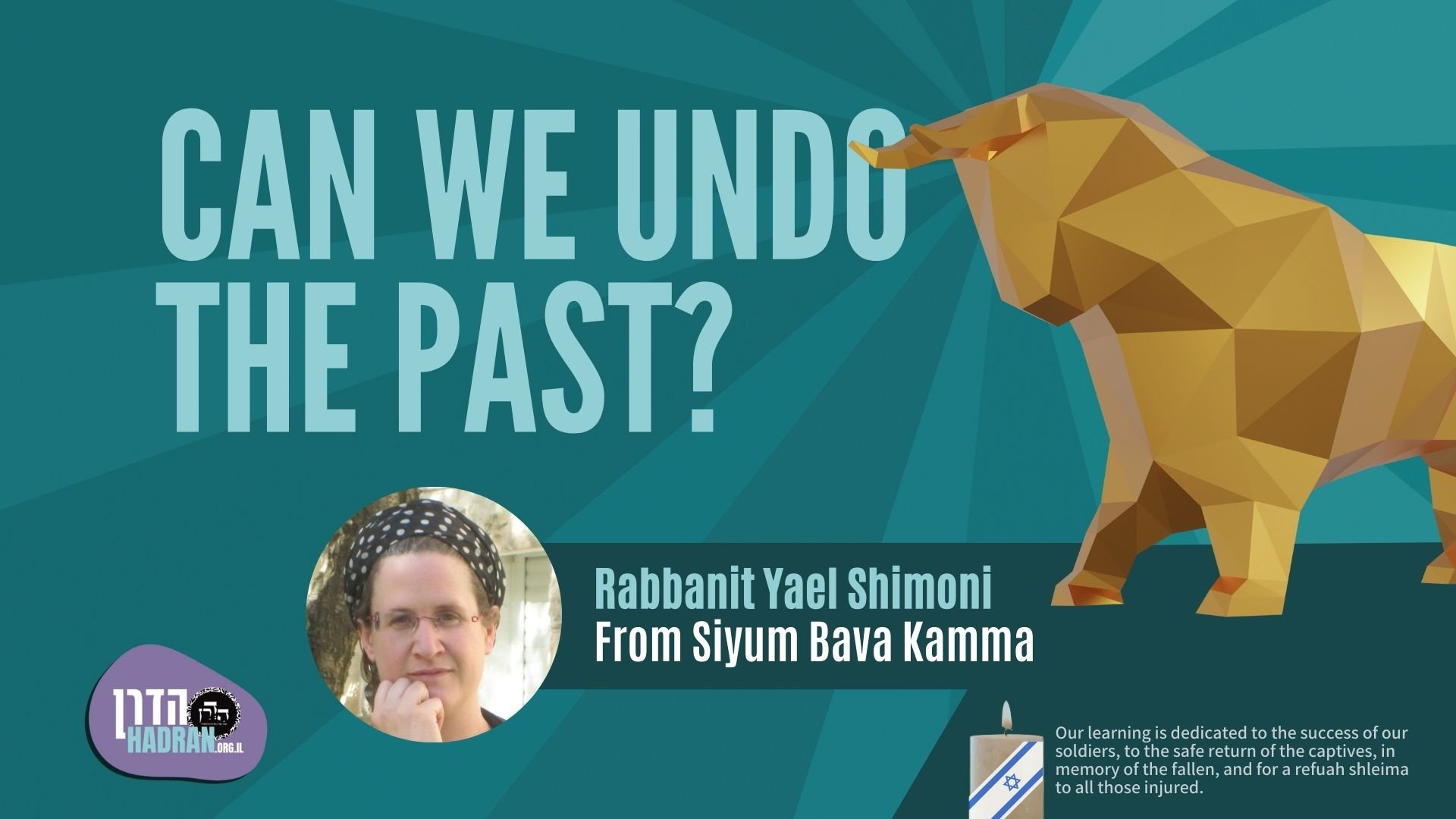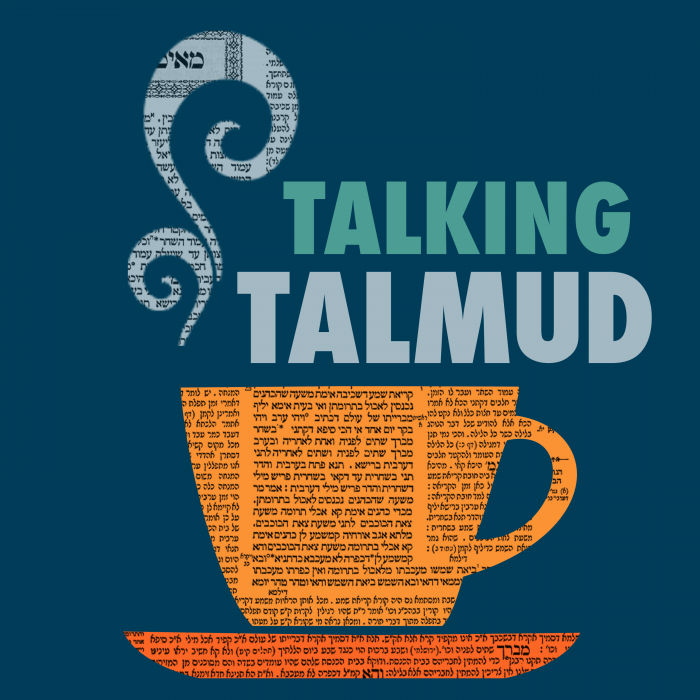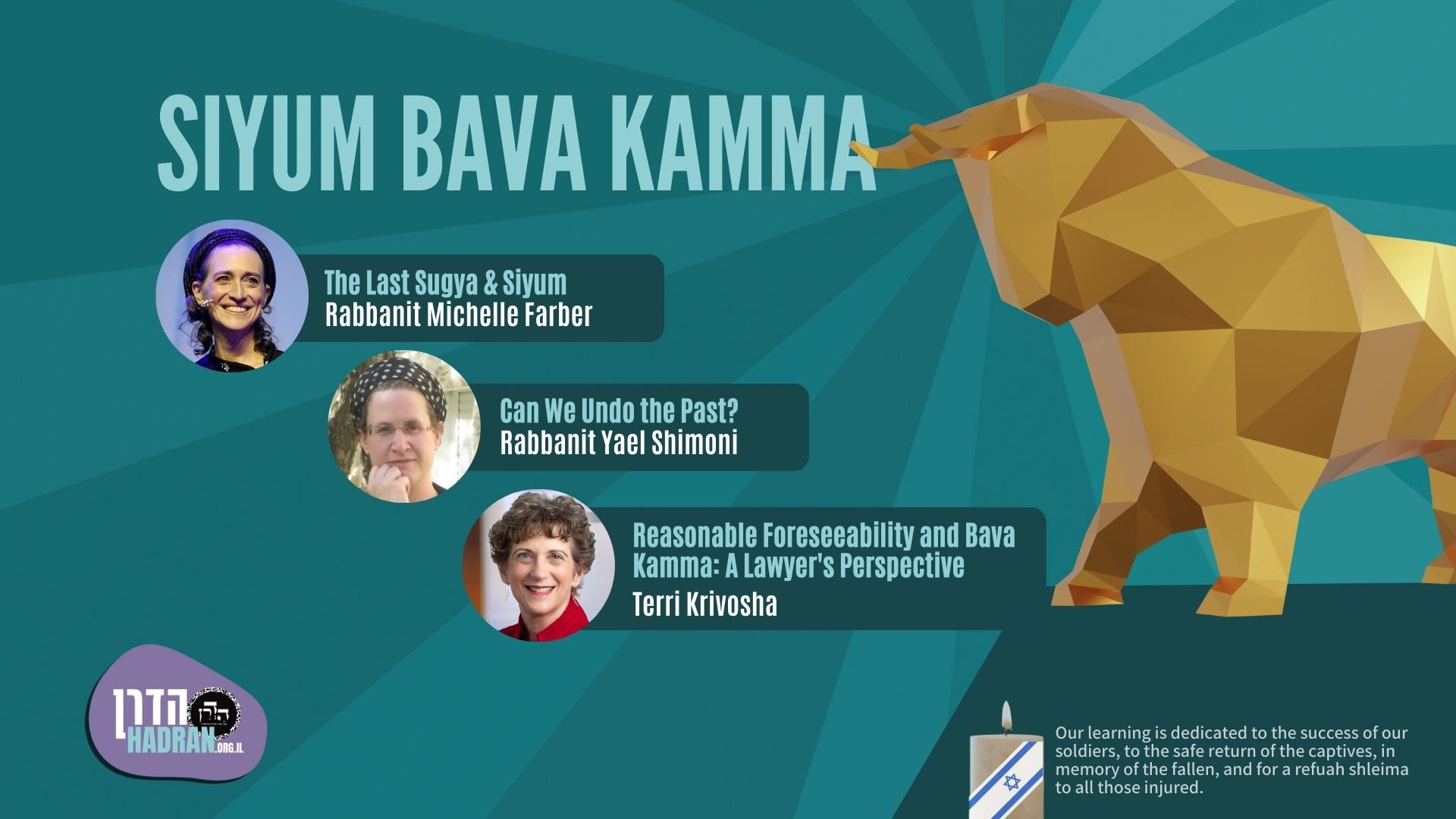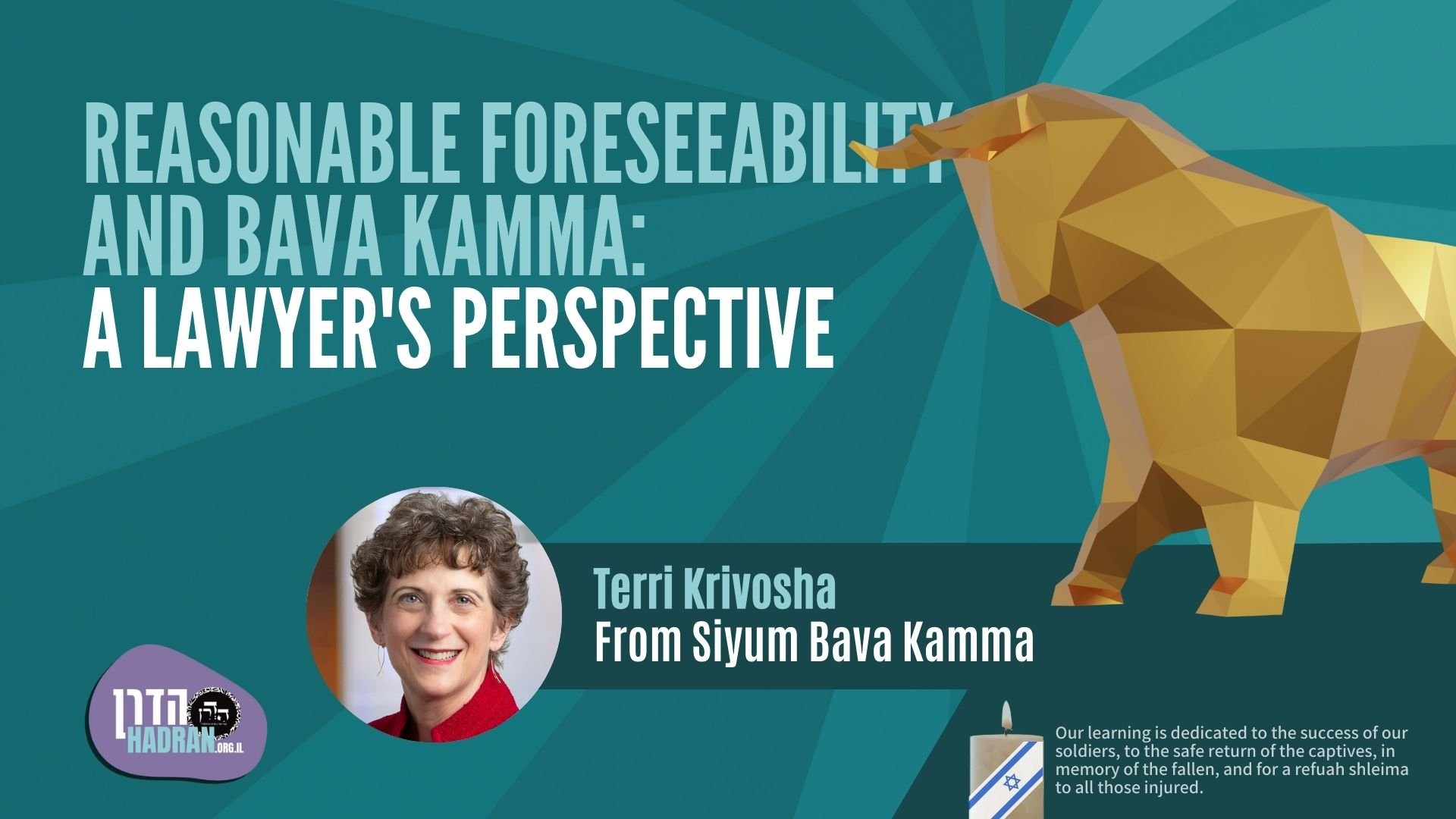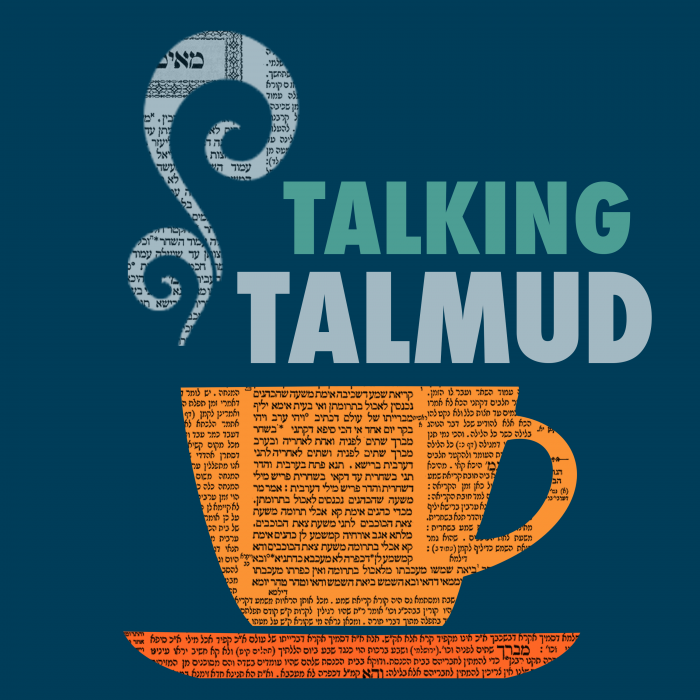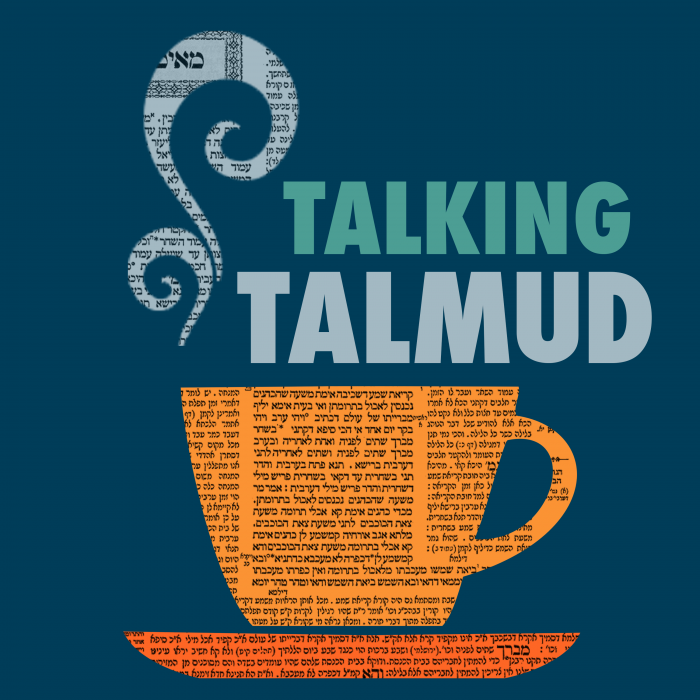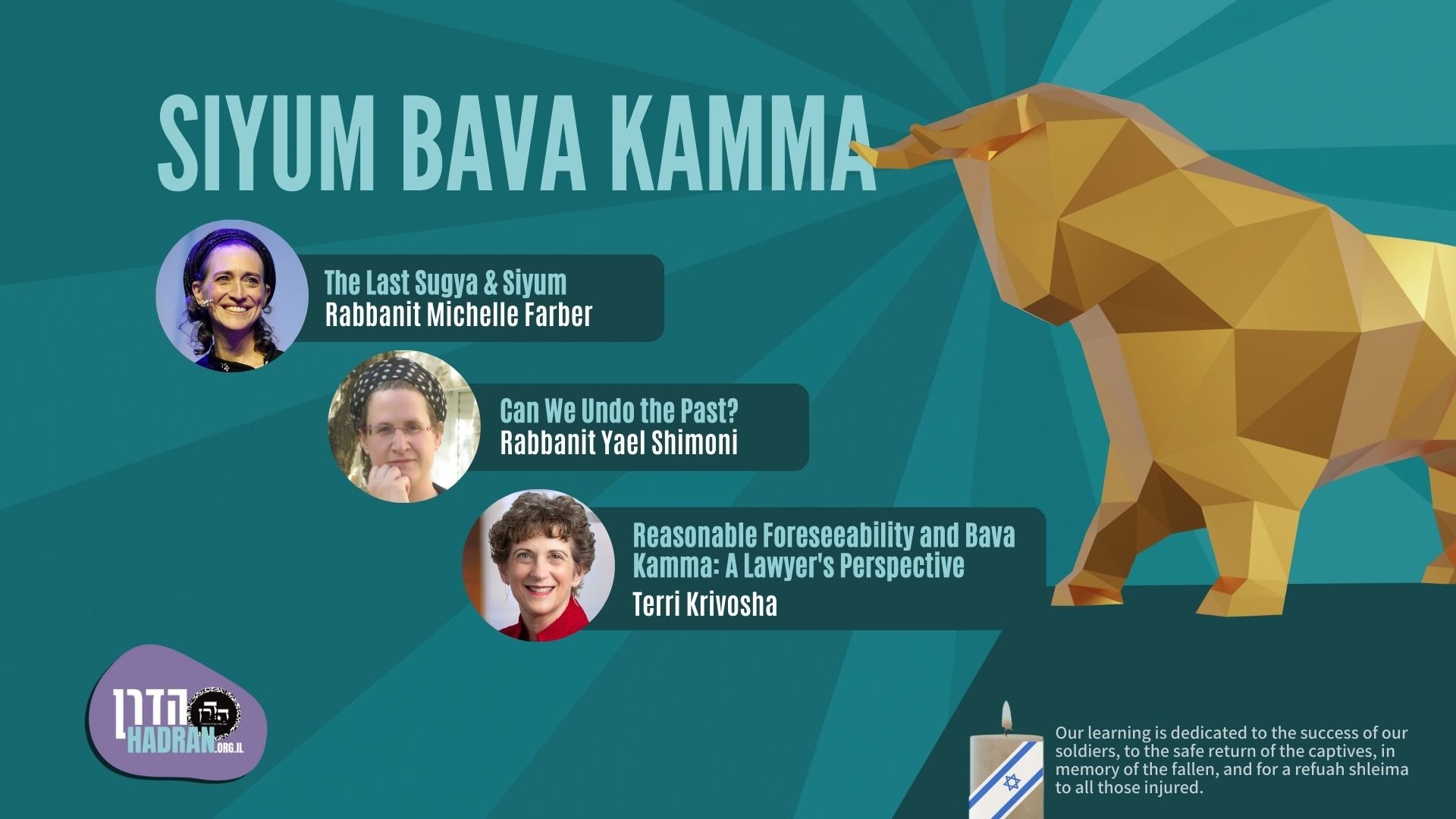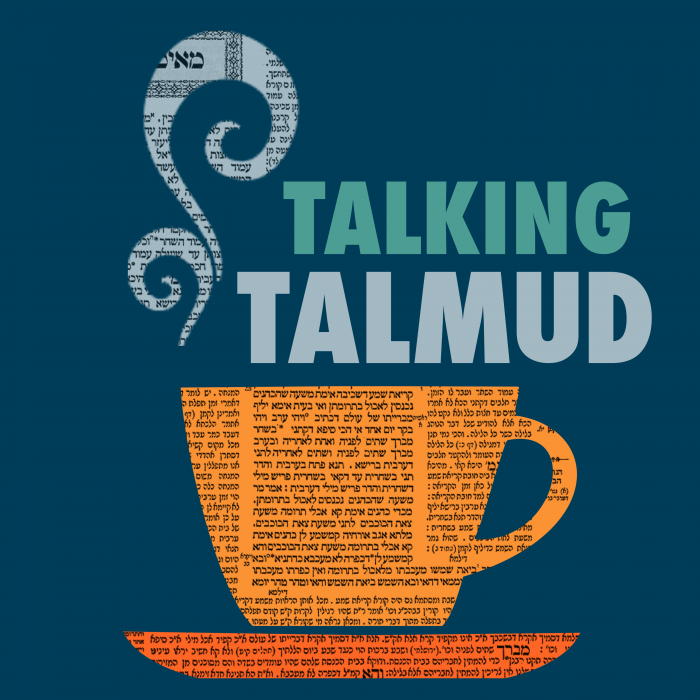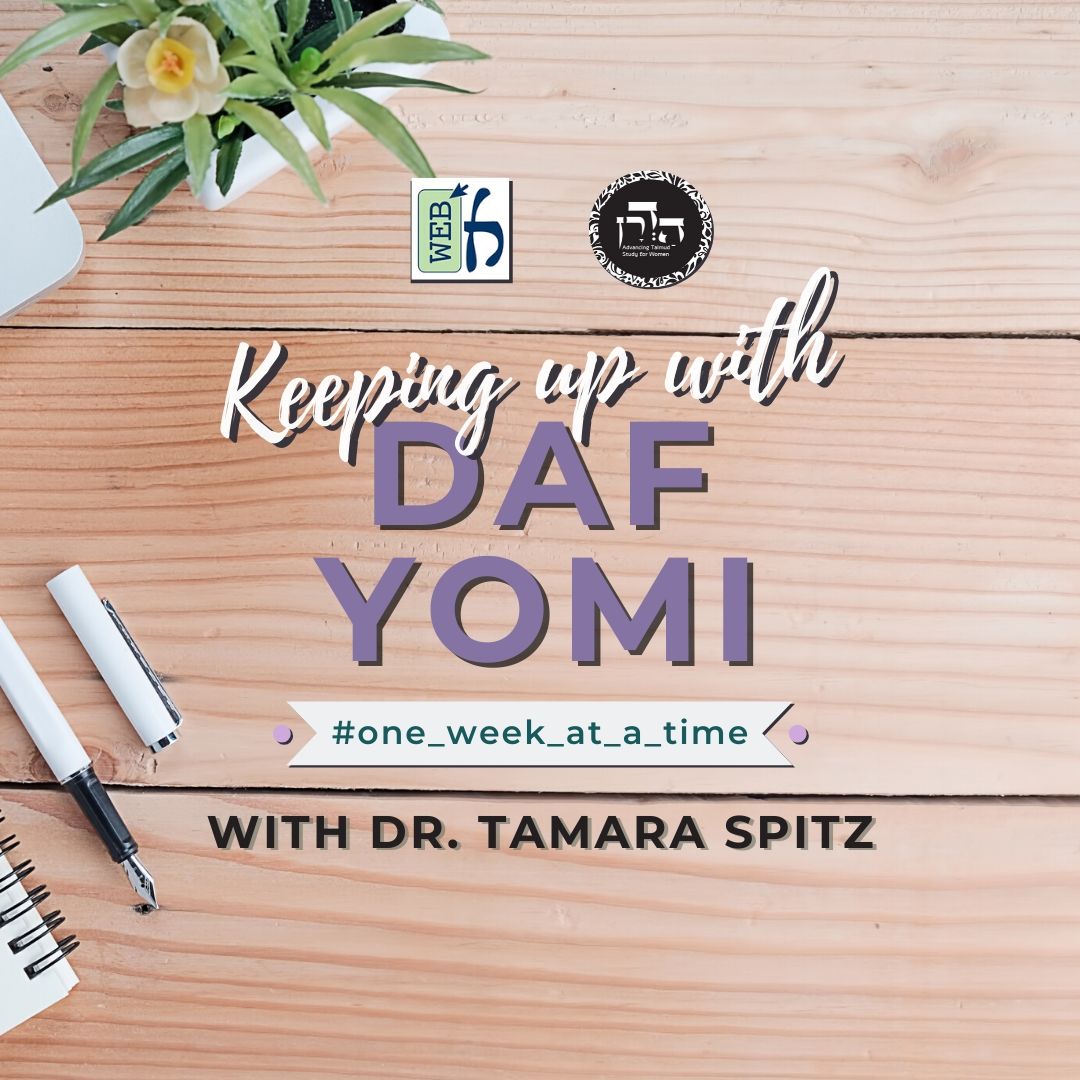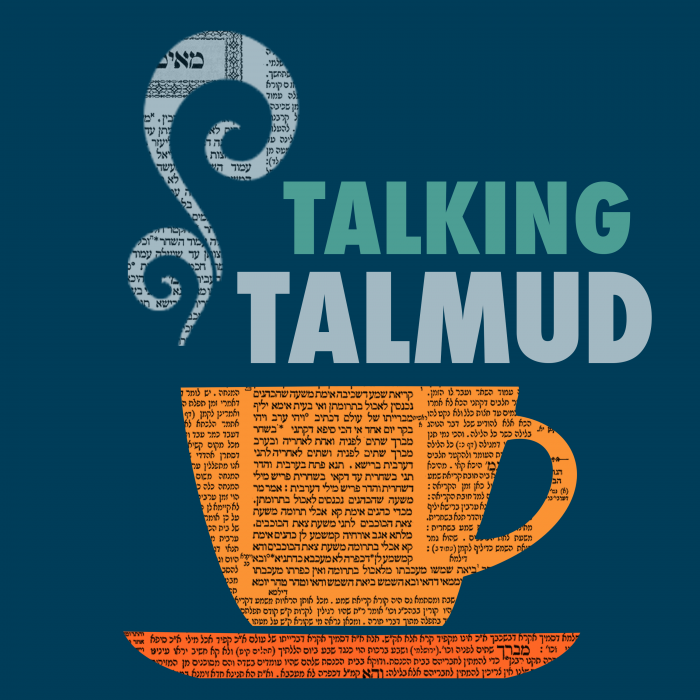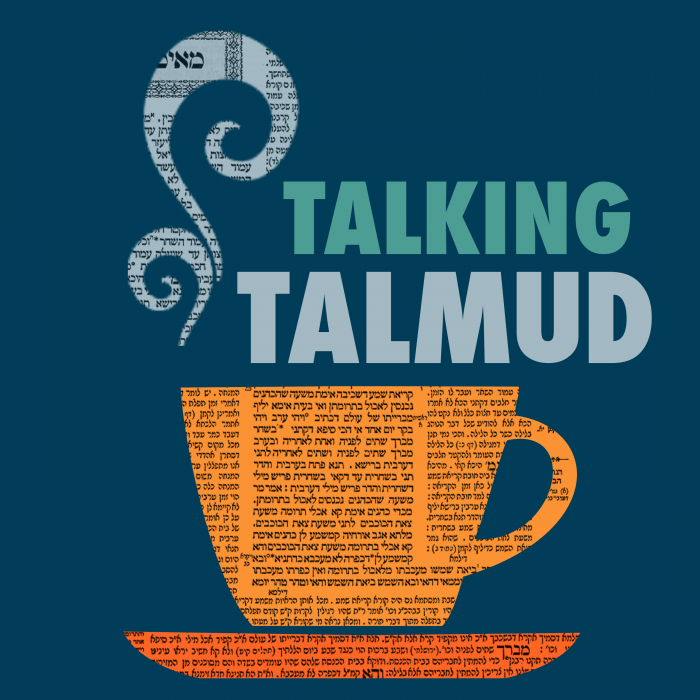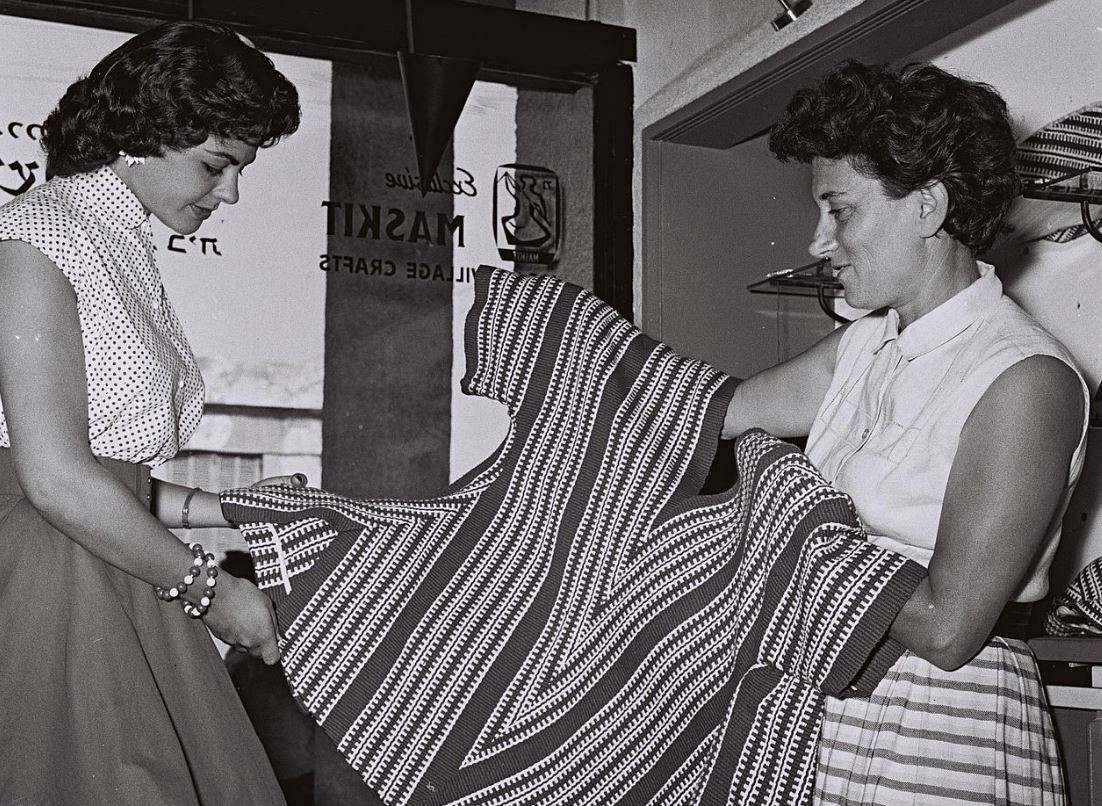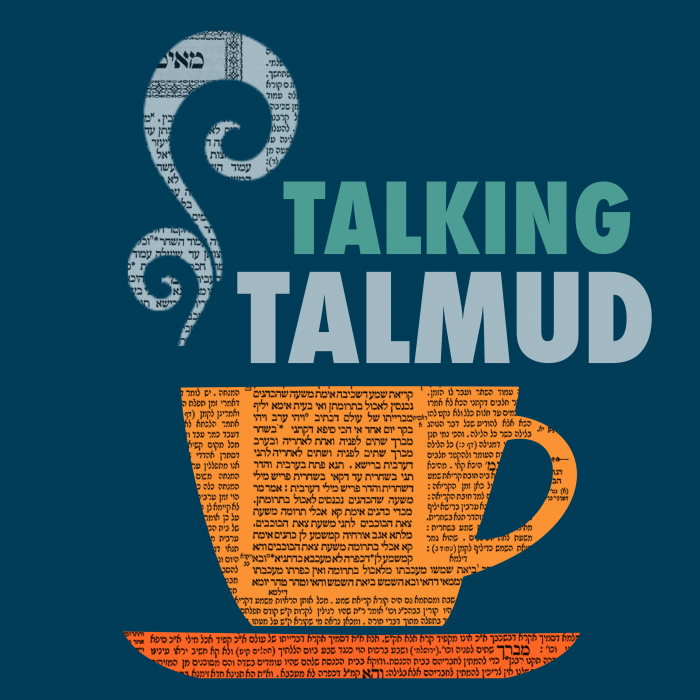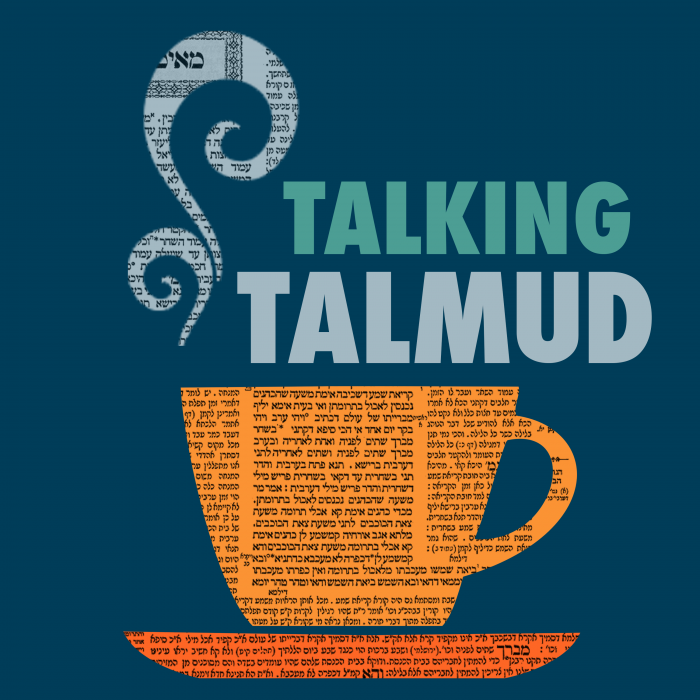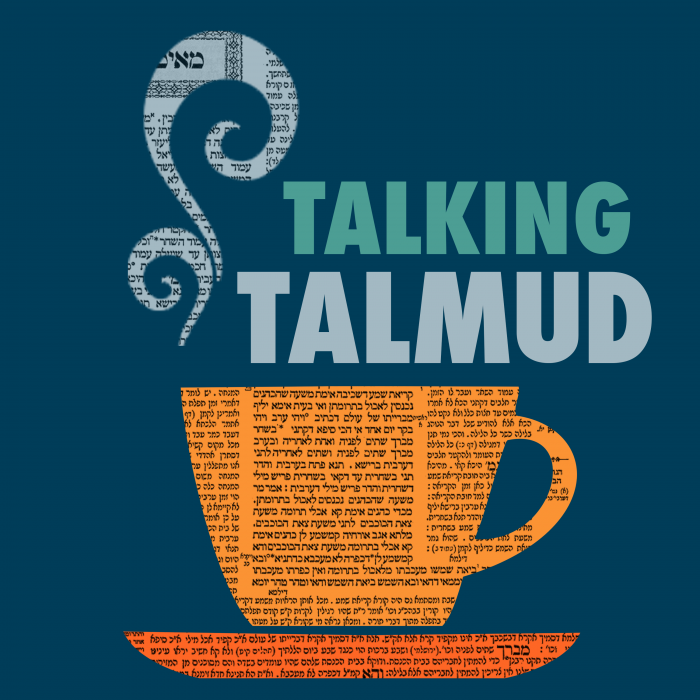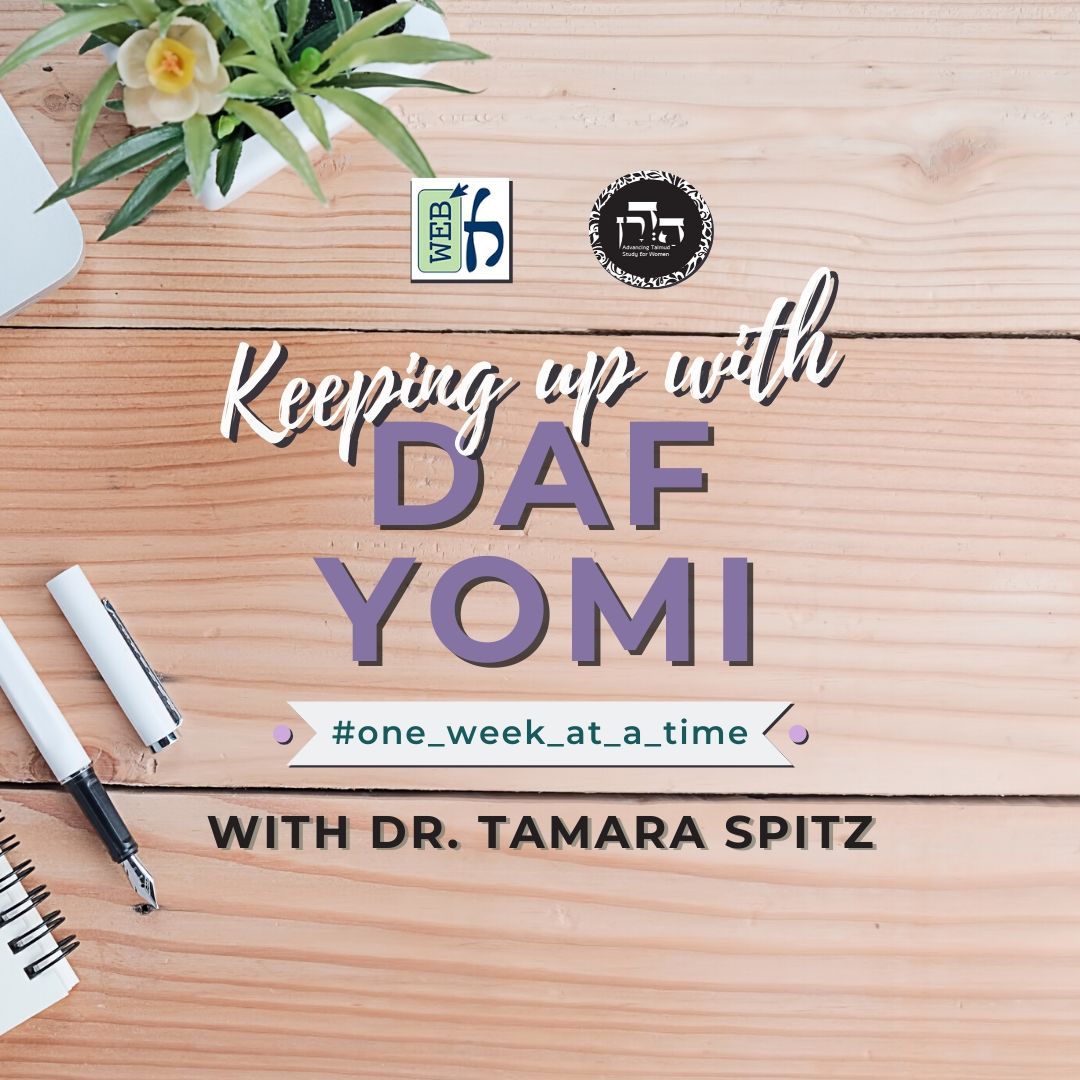Rabbi Yosi h’Gelili holds that kodshim kalim are considered the property of the owner and not the property of God. The Gemara concludes that this is true even during the time of the Temple when they can be brought as sacrifices. Ben Azai holds that this is limited to only some types of koshei kodashim, however, there is a debate about which ones he excluded. Rava offers a different explanation for the phrase in the Mishna “property that does not have meila,” that it excludes any sanctified item. Rabbi Abba, holding like Rabbi Yosi h’Gelili explains that if an animal designated for a peace offering causes damage, the payment is from the meat that can be eaten and not from the part burned on the altar. What does he mean by this and how does it relate to the debate between Rabbi Natan and the rabbis regarding an animal who pushed someone else’s animal into a pit dug by a third person? What is meant in the Mishna when it limits damages payment to “those part of the covenant”? What is meant by “assigned property?” Some hold it is excluding a case when it is unclear whose animal caused the damage. Others hold that it excludes a case where the animal who damaged was ownerless. There is a debate about what situation this is referring to. If one’s animal caused damage in the property of its owner, the owner is not liable as the owner can say, “What were you doing in my property!” If it was jointly owned by both people (the damager and the damaged), is the owner exempt or liable? There is a tannaitic debate on this issue and it all depends on different ways to read the end of our Mishna. What case is included by the line at the end of the Mishna – “in a case where one is liable, one needs to pay from the best of the land?”
Bava Kamma 13
Share this shiur:
Bava Kamma
Masechet Bava Kamma is sponsored by the Futornick Family in loving memory of their fathers and grandfathers, Phillip Kaufman and David Futornick.
This month’s learning is dedicated to the refuah shleima of our dear friend, Phyllis Hecht, גיטל פעשא בת מאשה רחל by all her many friends who love and admire her. Phyllis’ emuna, strength, and positivity are an inspiration.
Want to dedicate learning? Get started here:


Today’s daily daf tools:
Bava Kamma
Masechet Bava Kamma is sponsored by the Futornick Family in loving memory of their fathers and grandfathers, Phillip Kaufman and David Futornick.
This month’s learning is dedicated to the refuah shleima of our dear friend, Phyllis Hecht, גיטל פעשא בת מאשה רחל by all her many friends who love and admire her. Phyllis’ emuna, strength, and positivity are an inspiration.
Today’s daily daf tools:
Delve Deeper
Broaden your understanding of the topics on this daf with classes and podcasts from top women Talmud scholars.
New to Talmud?
Check out our resources designed to help you navigate a page of Talmud – and study at the pace, level and style that fits you.
The Hadran Women’s Tapestry
Meet the diverse women learning Gemara at Hadran and hear their stories.
Bava Kamma 13
לִישַׁנֵּי: הָא רַבִּי יוֹסֵי הַגְּלִילִי, הָא רַבָּנַן!
let Ravina answer Rava’s objection by saying: This baraita, which states that an offering of lesser sanctity is the property of its owner and may be sold even when the Temple stands, is in accordance with the opinion of Rabbi Yosei HaGelili, and it is referring to a case where the animal is still alive. And that qualification of the mishna by Rav Naḥman, that the sale of an unblemished firstborn animal when the Temple is standing is invalid, is in accordance with the opinion of the Rabbis, who dispute Rabbi Yosei HaGelili’s opinion.
(אֲמַר לֵיהּ), מַתְּנוֹת כְּהוּנָּה קָאָמְרַתְּ? שָׁאנֵי מַתְּנוֹת כְּהוּנָּה, דְּכִי קָא זָכוּ – מִשֻּׁלְחַן גָּבוֹהַּ קָא זָכוּ.
The Gemara answers: He said to him that this is not difficult: Do you speak of gifts to which members of the priesthood are entitled, of which a firstborn animal is an example? Gifts of the priesthood are different from other offerings of lesser sanctity, as when the priests receive their portions, they receive them from the table of the Most High. Rabbi Yosei HaGelili claims that the act of consecration of an animal as an offering of lesser sanctity does not nullify one’s ownership of the animal. The sanctity of a firstborn offering takes effect with its birth, so it may be that it was never owned; rather, it is reasonable that the Torah provided the priest only with the right and the obligation to partake of it after it is sacrificed.
גּוּפָא: ״וּמָעֲלָה מַעַל בַּה׳״ – לְרַבּוֹת קֳדָשִׁים קַלִּים שֶׁהֵם מָמוֹנוֹ, דִּבְרֵי רַבִּי יוֹסֵי הַגְּלִילִי. בֶּן עַזַּאי אוֹמֵר: לְרַבּוֹת אֶת הַשְּׁלָמִים. אַבָּא יוֹסֵי בֶּן דּוֹסְתַּאי אוֹמֵר: לֹא אָמַר בֶּן עַזַּאי אֶלָּא בִּבְכוֹר בִּלְבָד.
§ The Gemara considers the matter itself: The baraita teaches: Concerning one who steals another’s property and takes a false oath denying he has done so, incurring the obligation to bring a guilt-offering, the verse states: “And commits a trespass against the Lord, and deals falsely with his neighbor” (Leviticus 5:21). The verse serves to include a case in which one denies having in his possession offerings of lesser sanctity, which are the property of their owners, and are included in the phrase “and deals falsely with his neighbor.” This is the statement of Rabbi Yosei HaGelili. Ben Azzai says: This phrase serves to include peace-offerings. Abba Yosei ben Dostai says: Ben Azzai said this only with regard to a firstborn offering.
אָמַר מָר, בֶּן עַזַּאי אוֹמֵר: לְרַבּוֹת אֶת הַשְּׁלָמִים. לְמַעוֹטֵי מַאי?
The Master said in the baraita: Ben Azzai says: This phrase serves to include peace-offerings. The Gemara asks: Ben Azzai’s interpretation of the phrase, limiting its interpretation to a reference only to peace-offerings, is to exclude what?
אִילֵּימָא לְמַעוֹטֵי בְּכוֹר, הַשְׁתָּא וּמָה שְׁלָמִים – שֶׁטְּעוּנִים סְמִיכָה וּנְסָכִים וּתְנוּפַת חָזֶה וָשׁוֹק, אָמְרַתְּ מָמוֹן בְּעָלִים הוּא; בְּכוֹר מִבַּעְיָא?
If we say it is to exclude a firstborn offering, because he holds that a firstborn is not the property of the priest, one could reject this, as the sanctity of a firstborn offering is a lesser sanctity than that of a peace-offering, as follows: Now, just as with regard to peace-offerings, which have a higher degree of sanctity such that they require placing hands on the head of the offering and are accompanied by libations and the waving of their breast and the right hind leg by the priest and owner together, you nevertheless say that it is the property of the owners, is it necessary to state that with regard to a firstborn offering, for which these halakhot do not apply, that the priest has ownership of it?
אֶלָּא אָמַר רַבִּי יוֹחָנָן: לְמַעוֹטֵי מַעֲשֵׂר –
Rather, Rabbi Yoḥanan said: Ben Azzai mentioned peace-offerings in order to exclude an animal tithe offering, i.e., every tenth animal of one’s flock that is designated as tithe for those ten animals and is sacrificed as an offering of lesser sanctity. Animal tithes are excluded because ben Azzai holds that an animal tithe offering is not the property of the owner of the flock.
כִּדְתַנְיָא: בִּבְכוֹר נֶאֱמַר ״לֹא תִפְדֶּה״, וְנִמְכָּר תָּם – חַי, וּבַעַל מוּם – חַי וְשָׁחוּט; בְּמַעֲשֵׂר נֶאֱמַר ״לֹא יִגָּאֵל״, וְאֵינוֹ נִמְכָּר לֹא חַי וְלֹא שָׁחוּט, לֹא תָּם וְלֹא בַּעַל מוּם.
This is as it is taught in a baraita: With regard to a firstborn offering it is stated: “You shall not redeem” (Numbers 18:17), indicating that the owner can never fully redeem the offering, thereby removing its sanctity. And the firstborn offering can be sold when it is unblemished and alive, or when it is blemished and alive, or blemished and slaughtered. With regard to animal tithe offerings, it is stated: “It shall not be redeemed” (Leviticus 27:33), indicating that the one who designated it can never fully redeem an animal tithe offering, thereby removing its sanctity. And the animal tithe offering cannot be sold, not when it is alive and not when it is slaughtered, not when unblemished and not when blemished. The fact that the sale of an animal tithe offering is invalid demonstrates that it is not the property of the one who designated it.
רָבִינָא מַתְנֵי לַהּ אַסֵּיפָא – אַבָּא יוֹסֵי בֶּן דּוֹסְתַּאי אוֹמֵר: לֹא אָמַר בֶּן עַזַּאי, אֶלָּא בִּבְכוֹר בִּלְבָד. לְמַעוֹטֵי מַאי?
Ravina taught the preceding discussion with regard to the last clause of the baraita: Abba Yosei ben Dostai says that ben Azzai said this only with regard to a firstborn offering. The Gemara asks: Abba Yosei ben Dostai’s interpretation of the phrase, limiting its interpretation to a reference only to a firstborn offering, is to exclude what?
אִילֵּימָא לְמַעוֹטֵי שְׁלָמִים, הַשְׁתָּא וּמָה בְּכוֹר – שֶׁקָּדוֹשׁ מֵרֶחֶם, מָמוֹנוֹ הוּא; שְׁלָמִים מִבַּעְיָא?
If we say it is to exclude peace-offerings, because he holds that they are not the property of the one who consecrated them as offerings, one could reject this, as the sanctity of peace-offerings is a lesser sanctity than that of a firstborn offering, as follows: Now, just as with regard to a firstborn offering, which is already sanctified upon its emergence from the womb yet nevertheless is the property of the priest, is it necessary to state that peace-offerings are the property of those who consecrated them, where the animals were already the property of its owner before they were consecrated?
אָמַר רַבִּי יוֹחָנָן: לְמַעוֹטֵי מַעֲשֵׂר.
Rabbi Yoḥanan said: Abba Yosei ben Dostai mentioned peace-offerings in order to exclude an animal tithe offering. Animal tithes are excluded because Abba Yosei ben Dostai holds that an animal tithe offering is not the property of the owner of the flock.
כִּדְתַנְיָא: בִּבְכוֹר נֶאֱמַר ״לֹא תִפְדֶּה״, וְנִמְכָּר תָּם – חַי, וּבַעַל מוּם – חַי וְשָׁחוּט; בְּמַעֲשֵׂר נֶאֱמַר ״לֹא יִגָּאֵל״, וְאֵינוֹ נִמְכָּר לֹא חַי וְלֹא שָׁחוּט, לֹא תָּם וְלֹא בַּעַל מוּם.
This is as it is taught in a baraita: With regard to a firstborn offering it is stated: “You shall not redeem” (Numbers 18:17), indicating that the owner can never fully redeem the offering, thereby removing its sanctity. And the firstborn offering can be sold when it is unblemished and alive, or when it is blemished and alive, or blemished and slaughtered. With regard to animal tithe offerings, it is stated: “It shall not be redeemed” (Leviticus 27:33), indicating that the one who designated it can never fully redeem an animal tithe offering, thereby removing its sanctity. And the animal tithe offering cannot be sold, not when it is alive and not when it is slaughtered, not when unblemished and not when blemished. The fact that the sale of an animal tithe offering is invalid demonstrates that it is not the property of the one who designated it.
הָא בִּבְכוֹר בִּלְבַד קָאָמַר! קַשְׁיָא.
The Gemara asks: How can one claim that Abba Yosei ben Dostai holds that peace-offerings are also owned by those who consecrated them? Doesn’t Abba Yosei ben Dostai say: Ben Azzai said this only with regard to a firstborn offering. The Gemara concedes: This is difficult.
רָבָא אָמַר: מַאי ״נְכָסִים שֶׁאֵין בָּהֶן מְעִילָה״ – נְכָסִים שֶׁאֵין בָּהֶן דִּין מְעִילָה. וּמַאי נִינְהוּ – דְּהֶדְיוֹט.
§ The Gemara cites an alternative explanation of the mishna’s statement: Rava said: What does the mishna mean when it says: One is liable only for damage caused to property for which, were one to use it for a mundane purpose, one would not be liable for the misuse of consecrated property? It is referring to property that is not at all subject to the halakhot of misuse of consecrated property, and what is that? It is referring to any property of an ordinary person, which has no sanctity at all.
וְלִיתְנֵי דְּהֶדְיוֹט! קַשְׁיָא.
The Gemara asks: But then let the mishna teach explicitly: One is liable only for damage caused to property of an ordinary individual. The Gemara concedes: This is difficult.
אָמַר רַבִּי אַבָּא: שְׁלָמִים שֶׁהִזִּיקוּ – גּוֹבֶה מִבְּשָׂרָן, וְאֵינוֹ גּוֹבֶה מֵאֵימוּרֵיהֶן.
§ Rabbi Abba says: With regard to the case of an innocuous animal that was consecrated as a peace–offering and that caused damage, the injured party collects damages from its meat, i.e., from the portion of the offering that would have been eaten by its owners. This is in accordance with the general halakha that the payment for damage caused by an innocuous ox is collected exclusively from the proceeds of the sale of the body of the ox and not from any other property of its owner. But he does not collect the damages from the sacrificial portions.
פְּשִׁיטָא, אֵימוּרִין לְגָבוֹהַּ סָלְקִי!
The Gemara asks: Isn’t it obvious that one collects exclusively from the meat portion and not from the sacrificial portions, as those are to be offered up to God?
לָא צְרִיכָא, לְגוֹבֶה מִבְּשָׂרָן כְּנֶגֶד אֵימוּרִים.
The Gemara answers: No, it is necessary for Rabbi Abba to teach that there is no collection from the owner’s meat portions corresponding to the sacrificial portions. Payment for damage caused by an innocuous animal is half the amount of the damages, and can be no more than the value of the animal itself. Rabbi Abba is teaching that when assessing the damage to determine the amount to be paid, one deems the owner responsible only according to his share of the animal, i.e., the meat portions, in relation to the animal as a whole.
אַלִּיבָּא דְּמַאן?
Rabbi Natan and the Rabbis engage in a dispute concerning the halakha in a case in which an ox pushed another animal into a pit (see 53a). If it were an innocuous ox, for which the Torah limits the owner’s liability to half the damages, the Rabbis rule that liability is incurred exclusively by the owner of the ox, i.e., he pays half the value of the damage, and the owner of the pit is entirely exempt. Rabbi Natan holds that since the damage was caused jointly by the ox and the pit, the owner of the ox need pay only half of what he would pay if his animal had been solely responsible, i.e., a quarter of the damages. Rabbi Natan further rules that the remaining sum can then be fully recovered from the owner of the pit, i.e., he pays the remaining three-quarters of the damages. The Gemara asks: In accordance with whose opinion, of those tanna’im, does Rabbi Abba state his ruling?
אִי אַלִּיבָּא דְּרַבָּנַן – פְּשִׁיטָא! הָא אָמְרִי כִּי לֵיכָּא לְאִשְׁתַּלּוֹמֵי מֵהַאי, לָא מִשְׁתַּלַּם מֵהַאי!
If it is in accordance with the opinion of the Rabbis, then it is obvious and there is no need to state it, as didn’t the Rabbis say: Whenever, for whatever reason, the full cost of the damage cannot be recovered from this party, it is not recovered from that party, i.e., even though the injured party suffered the loss of the full value of his animal and recovered only half its value from the owner of the ox, he may not demand the remaining sum from the owner of the pit. So too, in this case, where the injured party cannot collect damages from the sacrificial portions, he cannot recover that loss from the meat portions of the one who brought the offering.
וְאִי אַלִּיבָּא דְּרַבִּי נָתָן – הָא אָמַר: כִּי לֵיכָּא לְאִשְׁתַּלּוֹמֵי מֵהַאי, מִשְׁתַּלַּם מֵהַאי!
And if it is in accordance with the opinion of Rabbi Natan, doesn’t he say: Whenever the full cost of the damage cannot be recovered from this one, it is recovered from that one, i.e., since the owner of the ox pays only a quarter of the damages, the remaining sum can be recovered from the owner of the pit. So too, in this case, since the injured party cannot collect payment from the sacrificial portions, he should be able to recover that loss from the meat portions of the one who brought the offering, in contrast to the ruling of Rabbi Abba.
אִי בָּעֵית אֵימָא: רַבִּי נָתָן, אִיבָּעֵית אֵימָא: רַבָּנַן.
The Gemara explains: If you wish, say Rabbi Abba’s ruling is in accordance with Rabbi Natan, and if you wish, say his ruling is in accordance with the Rabbis.
אִיבָּעֵית אֵימָא רַבָּנַן – הָנֵי מִילֵּי בִּתְרֵי גוּפֵי, אֲבָל בְּחַד גּוּפָא מָצֵי אָמַר לֵיהּ: ״מִכֹּל הֵיכָא דְּבָעֵינָא – מִשְׁתַּלַּמְנָא״.
The Gemara explains: If you wish, say Rabbi Abba’s ruling is in accordance with the Rabbis, as one might have thought that this matter, the ruling of the Rabbis, applies only where the damage is caused by two bodies, such as an ox and a pit. But where the damage is caused by one body, as in the case of damage caused by an animal consecrated as a peace-offering, the injured party can say to the owner of the animal: From anywhere that I want to, I will recover my losses, and accordingly, the injured party could collect the full cost of the damage from the meat portions of the one who brought the offering. Therefore, it is necessary for Rabbi Abba to teach that this is not the halakha.
אִיבָּעֵית אֵימָא רַבִּי נָתָן – הָתָם הוּא דַּאֲמַר לֵיהּ בַּעַל שׁוֹר לְבַעַל הַבּוֹר: ״אֲנָא תּוֹרַאי בְּבֵירָךְ אַשְׁכַּחְתֵּיהּ; מַאי דְּלֵית לִי לְאִשְׁתַּלּוֹמֵי מֵהַיְאךְ – מִשְׁתַּלַּימְנָא מִינָּךְ״;
And if you wish, say Rabbi Abba’s ruling is in accordance with Rabbi Natan: It is only there that the owner of the damaged ox can say to the owner of the pit: Since I found my ox in your pit, ultimately you bear responsibility for any damage, and therefore whatever I cannot recover from the other one, i.e., the owner of the ox, I will recover from you.
אֲבָל הָכָא, מִי מָצֵי אָמַר: ״בָּשָׂר אַזֵּיק, אֵימוּרִין לָא אַזִּיק״?!
But here, in the case of damage caused by an animal consecrated as a peace-offering, is the injured party actually able to say: Only the meat of the animal caused damage but the sacrificial portions did not cause damage? Since the entire animal caused the damage, he does not collect the full cost of the damage from the meat portions of the one who brought the offering.
אָמַר רָבָא: תּוֹדָה שֶׁהִזִּיקָה – גּוֹבֶה מִבְּשָׂרָהּ, וְאֵינוֹ גּוֹבֶה מִלַּחְמָהּ.
Rava says: In the case of an innocuous animal consecrated as a thanks-offering that caused damage, the injured party collects damages from its meat, i.e., from the portion of the offerings that would have been eaten by the one who brought the offering, but he does not collect from its bread, i.e., from the offering of forty loaves of bread that accompanies the sacrifice of the animal.
לֶחֶם – פְּשִׁיטָא!
The Gemara asks: Isn’t it obvious that he does not collect from the bread? The bread is not part of the animal that caused damage.
סֵיפָא אִצְטְרִיךְ לֵיהּ – נִיזָּק אוֹכֵל בָּשָׂר, וּמִתְכַּפֵּר מֵבִיא לֶחֶם.
The Gemara answers: It was necessary for Rava to state this because of the latter clause of his ruling, which states: The injured party eats the meat portions of the offering according to the value of the damages owed to him, but the one achieving atonement, i.e., the one bringing the offering, brings the bread.
הָא נָמֵי פְּשִׁיטָא! מַהוּ דְּתֵימָא, כֵּיוָן דְּלֶחֶם הֶכְשֵׁירָא דְזֶבַח הוּא – לֵימָא לֵיהּ: אַתְּ אָכְלַתְּ בְּשַׂר, וַאֲנָא אַיְיתֵי לֶחֶם; קָא מַשְׁמַע לַן דְּלֶחֶם חִיּוּבָא דִּבְעָלִים הוּא.
The Gemara asks: Isn’t this also obvious? Why should anyone else bring the bread? The Gemara explains: Lest you say, since the bread is a necessary qualifying factor for the thanks-offering, as without it one does not fulfill one’s obligation, let the owner of the offering say to the one eating it, why should you eat the meat and I bring the bread? If you wish to eat, you should bring the bread. Therefore, Rava teaches us that the offering of the loaves of bread is the obligation of the owners of the offering.
נְכָסִים שֶׁהֵן שֶׁל בְּנֵי בְרִית.
§ The mishna teaches: One is liable only for damage caused to property that belongs to members of the covenant.
לְמַעוֹטֵי מַאי? אִי לְמַעוֹטֵי דְּגוֹי – הָא קָתָנֵי לַהּ לְקַמַּן: שׁוֹר שֶׁל יִשְׂרָאֵל שֶׁנָּגַח שׁוֹר שֶׁל גּוֹי – פָּטוּר! תָּנֵי וַהֲדַר מְפָרֵשׁ.
The Gemara asks: This clause serves to exclude what? If it serves to exclude the property of a gentile, isn’t that already explicitly taught in the mishna below (37b): In the case of an ox of a Jew that gored an ox of a gentile, the Jew is exempt. The Gemara answers: The tanna teaches this as a principle in the mishna here and then explains it in greater detail in the mishna below.
נְכָסִים הַמְיוּחָדִין. לְמַעוֹטֵי מַאי? אָמַר רַב יְהוּדָה: לְמַעוֹטֵי זֶה אוֹמֵר ״שׁוֹרְךָ הִזִּיק״, וְזֶה אוֹמֵר ״שׁוֹרְךָ הִזִּיק״.
The mishna continues: One is liable only for assigned property. The Gemara asks: This clause serves to exclude what? Rav Yehuda said: This clause serves to exclude a case in which an animal is injured but it is unclear which of two oxen, owned by different people, caused the damage. The owner of this ox says to the owner of the other: Your ox caused the damage. And the owner of that ox says to the owner of the other: Your ox caused the damage. Since it cannot be proven which ox actually caused the damage, neither owner is liable. The intention of the mishna is that one is liable only where the belligerent ox is assigned to, i.e., is known to be the property of, a specific individual.
הָא תָּנֵי לְקַמַּן: הָיוּ שְׁנַיִם רוֹדְפִין אַחַר אֶחָד, זֶה אוֹמֵר: ״שׁוֹרְךָ הִזִּיק״, וְזֶה אוֹמֵר: ״שׁוֹרְךָ הִזִּיק״ – שְׁנֵיהֶם פְּטוּרִין! תָּנֵי וַהֲדַר מְפָרֵשׁ.
The Gemara asks: Isn’t that explicitly taught in the mishna below (35a): If two oxen were seen pursuing a single ox, and then the single ox is found to be injured, and the owner of this ox says to the owner of the other: Your ox caused the damage. And the owner of that ox says to the owner of the other: Your ox caused the damage. In such a case, both of them are exempt since it is uncertain which one is guilty. The Gemara answers: The tanna teaches this as a principle in the mishna here and then explains it in greater detail in the mishna below.
בְּמַתְנִיתָא תָּנָא: פְּרָט לְנִכְסֵי הֶפְקֵר. הֵיכִי דָמֵי? אִילֵּימָא דִּנְגַח תּוֹרָא דִידַן לְתוֹרָא דְהֶפְקֵר – מַאן תָּבַע לֵיהּ? אֶלָּא דִּנְגַח תּוֹרָא דְהֶפְקֵר לְתוֹרָא דִידַן –
It was taught in a baraita in explanation of the mishna that the term assigned property serves to exclude ownerless property. The Gemara clarifies: What are the circumstances in which the mishna teaches that one is exempt? If we say it is referring to a case where an ox belonging to us, i.e., to a Jew, gored an ownerless ox, it is obvious that the owner bears no liability, as who is claiming damages from him? Rather, it must be referring to a case where an ownerless ox gored an ox belonging to us, and it teaches that the injured party does not have a right to damages.
לֵיזִיל וְלַיְתֵיהּ! בְּשֶׁקָּדַם וְזָכָה בּוֹ אַחֵר.
The Gemara asks: What is the point of this halakha? If the injured party wishes to recover his losses, let him go and take the belligerent ox for himself, since it is currently ownerless. The Gemara explains: The mishna teaches that the injured party does not have any right to the ox, in order to teach that in a case where another person preceded him and acquired it, the injured party has no claim to it.
רָבִינָא אָמַר: לְמַעוֹטֵי נָגַח וְאַחַר כָּךְ הִקְדִּישׁ; נָגַח וְאַחַר כָּךְ הִפְקִיר.
Ravina said an alternative interpretation of the mishna: The term assigned property serves to exclude a case in which an ox gored and subsequently its owner consecrated it, or where it gored and subsequently its owner declared it ownerless. Since the owners did not own the ox at the time the case was brought before the court, they are exempt from paying. Ravina explains that this is the intention of the mishna: That one is liable only when the property that caused the damage was owned by a responsible party both when it caused the damage and when it was tried. In this case, at the time of the court hearing it was not owned by a responsible party, as it was either consecrated or ownerless.
תַּנְיָא נָמֵי הָכִי, יָתֵר עַל כֵּן אָמַר רַבִּי יְהוּדָה: אֲפִילּוּ נָגַח וְאַחַר כָּךְ הִקְדִּישׁ, נָגַח וְאַחַר כָּךְ הִפְקִיר – פָּטוּר, שֶׁנֶּאֱמַר: ״וְהוּעַד בִּבְעָלָיו וְהֵמִית אִישׁ וְגוֹ׳״ – עַד שֶׁתְּהֵא מִיתָה וְהַעֲמָדָה בַּדִּין שָׁוִין כְּאֶחָד.
It is also taught in a baraita: The halakha is that an ox that kills a person is stoned to death. The mishna states (44b) that this does not apply to an ox consecrated to the Temple or an ownerless ox. Moreover, Rabbi Yehuda said: Even if an ox gored and its owner subsequently consecrated it to the Temple, or if an ox gored and its owner subsequently declared it ownerless, the owner is exempt from liability, as it is stated: “And if the ox was wont to gore in time past, and had been forewarned with its owner, and he had not guarded it in, and it killed a man or a woman; the ox shall be stoned, and also its owner shall be put to death” (Exodus 21:29). The repetition of the reference to the owner at the beginning and end of the verse indicates that the ox is not stoned unless the ox’s status as the owner’s property at the time of the death of the victim and at the time of the owner’s standing trial is the same, i.e., the ox is owned by a responsible party for both events.
וּגְמַר הַדִּין לָא בָּעֵינַן?! הָא ״הַשּׁוֹר יִסָּקֵל״ – בִּגְמַר דִּין הוּא דִּכְתִיב!
The Gemara asks: But do we not also require that the ox’s status be the same at the time of the verdict? Isn’t the phrase: “The ox shall be stoned” written with regard to the time of the verdict?
אֶלָּא אֵימָא: עַד שֶׁתְּהֵא מִיתָה וְהַעֲמָדָה בְּדִין וּגְמַר דִּין שָׁוִין כְּאֶחָד.
Rather, say that the owner of the ox is exempt unless the ox’s status as the owner’s property at the time of the death of the victim and at the time of the owner’s standing trial and at the verdict is the same, i.e., the ox is owned by a responsible party for all three events.
חוּץ מֵרְשׁוּת הַמְיוּחֶדֶת לַמַּזִּיק. דְּאָמַר לֵיהּ: תּוֹרָךְ בִּרְשׁוּתִי מַאי בָּעֵי?
§ The mishna teaches: One is liable for damage caused in any place except for a domain designated exclusively for the use of the one responsible for the damage. The Gemara explains the reason for this: This is because the one liable for the damage can say to the injured party: What did your ox want in my domain? One does not have to guard his ox from causing damage within his own property, since another person’s animal has no right to be there.
וּרְשׁוּת הַנִּיזָּק וְהַמַּזִּיק.
The mishna continues: And one is liable for damage caused in a domain designated for the joint use of the injured party and the one liable for the damage.
אָמַר רַב חִסְדָּא אָמַר אֲבִימִי: חֲצַר הַשּׁוּתָּפִין – חַיָּיב בָּהּ עַל הַשֵּׁן וְעַל הָרֶגֶל. וְהָכִי קָאָמַר: ״חוּץ מֵרְשׁוּת הַמְיוּחֶדֶת לַמַּזִּיק״ – דְּפָטוּר; ״וּרְשׁוּת הַנִּיזָּק וְהַמַּזִּיק – כְּשֶׁהִזִּיק חָב הַמַּזִּיק״.
The Gemara cites a dispute concerning this case that results in two different ways of interpreting the mishna: Rav Ḥisda says that Avimi says: With regard to a courtyard designated for the joint use of two partners, either one of them is liable for damage caused by the ox of one partner to the property of the other partner while in it, both for the category of Eating and for the category of Trampling. And accordingly, this is what the mishna is saying: One is liable for damage caused in any place except for a domain designated exclusively for the use of the one responsible for the damage, as he is exempt there; but in a domain designated for the joint use of the injured party and the one responsible for the damage, when he causes damage, the one who is responsible for the damage is obligated to pay damages. The statement in the mishna concerning a domain designated for joint use is the beginning of the following clause and introduces a case in which one is liable for damage.
וְרַבִּי אֶלְעָזָר אָמַר: פָּטוּר עַל הַשֵּׁן וְעַל הָרֶגֶל. וְהָכִי קָאָמַר: ״חוּץ מֵרְשׁוּת הַמְיוּחֶדֶת לַמַּזִּיק, וּרְשׁוּת הַנִּיזָּק וְהַמַּזִּיק״ נָמֵי – פָּטוּר; ״וּכְשֶׁהִזִּיק חָב הַמַּזִּיק״ – לְאֵתוֹיֵי קֶרֶן.
And Rabbi Elazar says: In a courtyard designated for joint use, one is exempt for one’s ox causing damage to the property of his partner in the category of Eating, and for one’s ox causing damage to the property of his partner in the category of Trampling. And accordingly, this is what the mishna is saying: One is liable for damage caused in any place except for a domain designated exclusively for the use of the one responsible for the damage, and one is also exempt for damage done in a domain designated for the joint use of the injured party and the one liable for the damage. The statement in the mishna about a domain designated for joint use is a continuation of the previous clause and adds an additional case in which one is exempt. And the following clause: When one causes damage, the one liable for the damage is obligated to pay damages, serves to add the fact that one is liable for damage in the framework of the category of Goring, which was not previously mentioned in the mishna.
הָנִיחָא לִשְׁמוּאֵל, אֶלָּא לְרַב דְּאָמַר: תְּנָא שׁוֹר וְכֹל מִילֵּי דְשׁוֹר, ״חָב הַמַּזִּיק״ לְאֵתוֹיֵי מַאי?
This interpretation of the concluding clause of the mishna, as a reference to Goring, works out well according to Shmuel, in his dispute with Rav (3b) concerning the meaning of Ox and Maveh in the first mishna of this chapter. According to Shmuel they mean Trampling and Eating, respectively, and Goring has yet to be addressed. But according to Rav, who says: The term ox in the mishna includes damage caused by the ox and all matters involving damaging actions that are completed by an ox, including Goring, Eating, and Trampling, Goring is already addressed in the mishna. What is added by the clause: The one liable for the damage is obligated to pay damages?
לְאֵתוֹיֵי הָא דְּתָנוּ רַבָּנַן: ״כְּשֶׁהִזִּיק חָב הַמַּזִּיק״ – לְהָבִיא שׁוֹמֵר חִנָּם וְהַשּׁוֹאֵל נוֹשֵׂא שָׂכָר וְהַשּׂוֹכֵר, שֶׁהִזִּיקָה בְּהֵמָה בִּרְשׁוּתָן; תָּם – מְשַׁלֵּם חֲצִי נֶזֶק, וּמוּעָד – מְשַׁלֵּם נֶזֶק שָׁלֵם. נִפְרְצָה בַּלַּיְלָה אוֹ שֶׁפְּרָצוּהָ לִסְטִין, וְיָצְתָה וְהִזִּיקָה – פָּטוּר.
The Gemara answers: It serves to add that which the Sages taught in a baraita that elucidates the mishna’s statement. The mishna states: When an animal or item one is responsible to safeguard causes damage, the one liable for the damage caused by insufficiently safeguarding it is obligated to pay payments of restitution for damage. This serves to include the cases of an unpaid bailee, a borrower, a paid bailee, and a renter, in which an animal, e.g., an ox, caused damage while in their possession. If the ox was innocuous, he pays half of the damages, and if it was forewarned, he pays the full damages. If the ox was safely enclosed and a wall broke open at night, or if bandits [listin] broke it open and the ox went out and caused damage, he is exempt from liability.
אָמַר מָר: כְּשֶׁהִזִּיק חָב הַמַּזִּיק – לְהָבִיא שׁוֹמֵר חִנָּם וְהַשּׁוֹאֵל נוֹשֵׂא שָׂכָר וְהַשּׂוֹכֵר. הֵיכִי דָּמֵי?
The Gemara analyzes the baraita: The Master said that the mishna states: When an animal or item one is responsible to safeguard causes damage, the one liable for the damage caused by insufficiently safeguarding it is obligated to pay payments of restitution for damage. This serves to include the cases of an unpaid bailee, a borrower, a paid bailee, and a renter. The Gemara asks: What are the circumstances?
אִילֵימָא דְּאַזְּקֵיהּ תּוֹרָא דְמַשְׁאִיל לְתוֹרָא דְשׁוֹאֵל – לֵימָא לֵיהּ: אִילּוּ אַזֵּיק בְּעָלְמָא – בָּעֵית לְשַׁלּוֹמֵי אַתְּ; הַשְׁתָּא דְּאַזְּקֵיהּ לְתוֹרָא דִידָךְ, בָּעֵינָא לְשַׁלּוֹמֵי?!
If we say that the lender’s ox, which was under the watch of the borrower, injured the borrower’s ox, and the baraita is teaching that the lender is liable to pay the borrower, why is this so? Let the lender say to the borrower: If my ox had injured an ox in the world at large, i.e., someone else’s ox, you, the borrower, would be required to pay, as you were entrusted with safeguarding it. Now that my ox has injured your ox, should I be required to pay?
אֶלָּא דְּאַזְּקֵיהּ תּוֹרָא דְשׁוֹאֵל לְתוֹרָא דְמַשְׁאִיל – לֵימָא לֵיהּ: אִילּוּ אִיתַּזַּק מֵעָלְמָא – בָּעֵית לְשַׁלּוֹמֵי כּוּלֵּיהּ תּוֹרָא; הַשְׁתָּא דְּאַזְּקֵיהּ תּוֹרָא דִידָךְ, פַּלְגָא נִיזְקָא הוּא דִּמְשַׁלְּמַתְּ לִי?!
Rather, the case must be that the borrower’s ox injured the lender’s ox, and the baraita is teaching that the borrower is liable to pay. The Gemara asks: According to this interpretation, the baraita teaches that if the belligerent ox was innocuous, the borrower is liable to pay only half of the damages. But why? Let the lender say to the borrower: By borrowing my ox, you undertook full responsibility for it such that if my ox had been injured by an ox from the world at large, you would be required to pay me for the entire value of my ox, irrespective of whether the belligerent ox was considered innocuous or forewarned. Now that it is your ox that injured my ox, should you have to pay only half of the damages? This interpretation of the baraita is also difficult.
לְעוֹלָם דְּאַזְּקֵיהּ תּוֹרָא דְמַשְׁאִיל לְתוֹרָא דְשׁוֹאֵל, וְהָכָא בְּמַאי עָסְקִינַן – שֶׁקִּבֵּל עָלָיו שְׁמִירַת גּוּפוֹ,
The Gemara explains: Actually, the case is where the lender’s ox injured the borrower’s ox, and with what are we dealing here? This is a case where the borrower undertook the responsibility of safeguarding the body of the lender’s ox from being injured,


